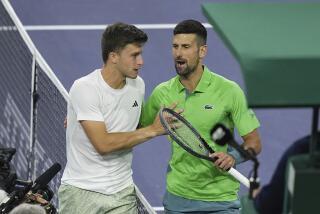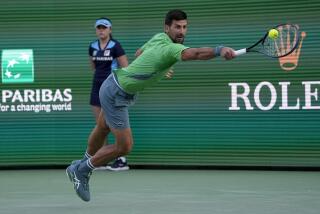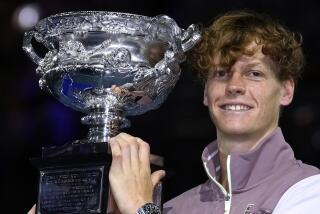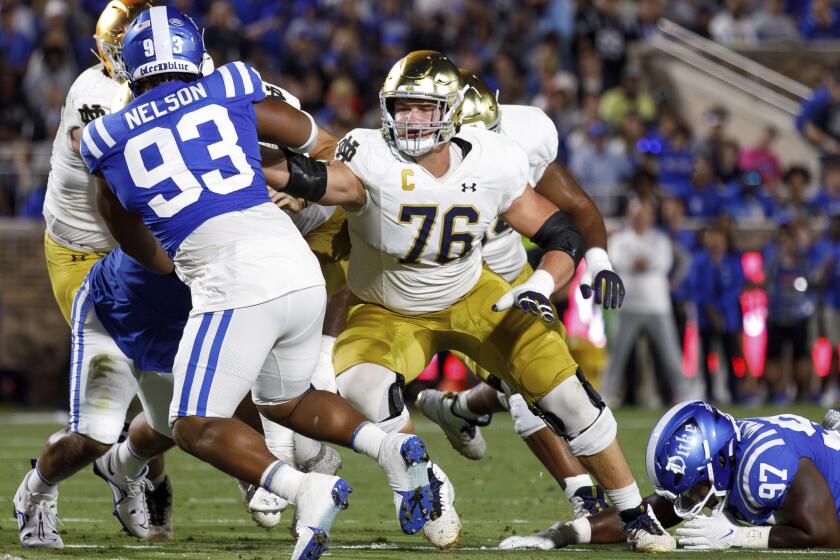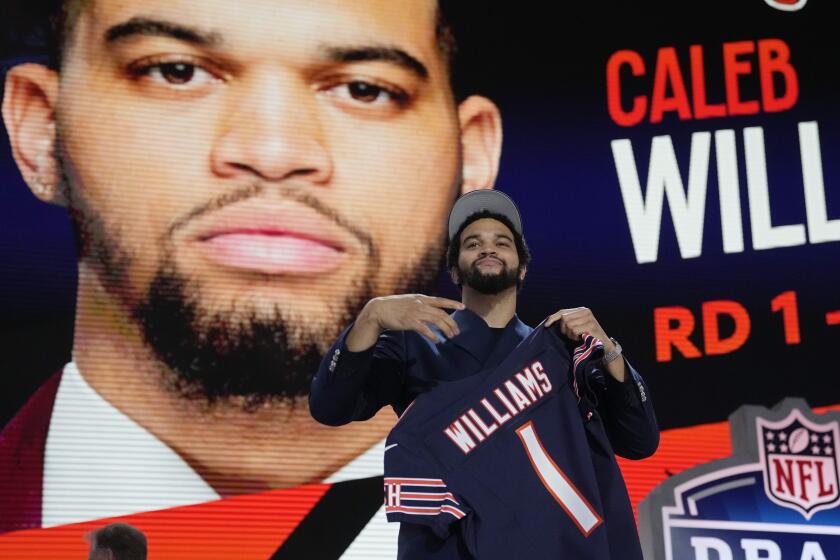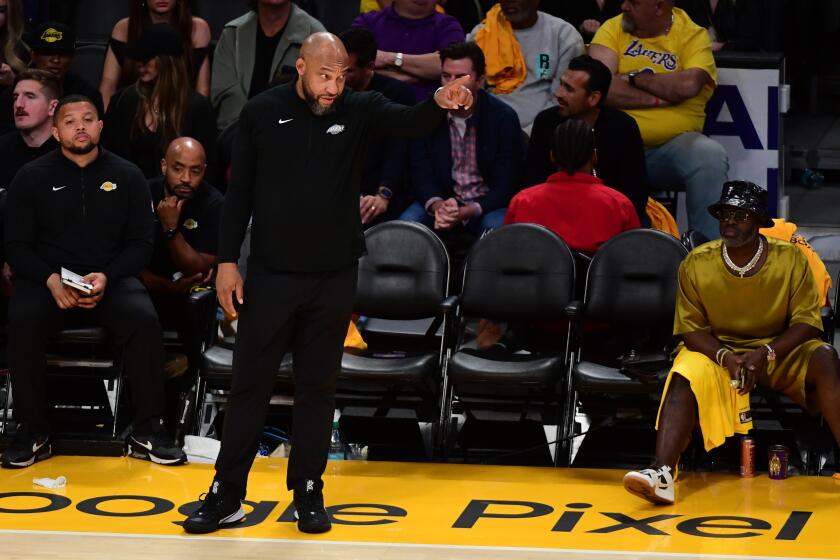Rafael Nadal beats Novak Djokovic for ninth French Open title
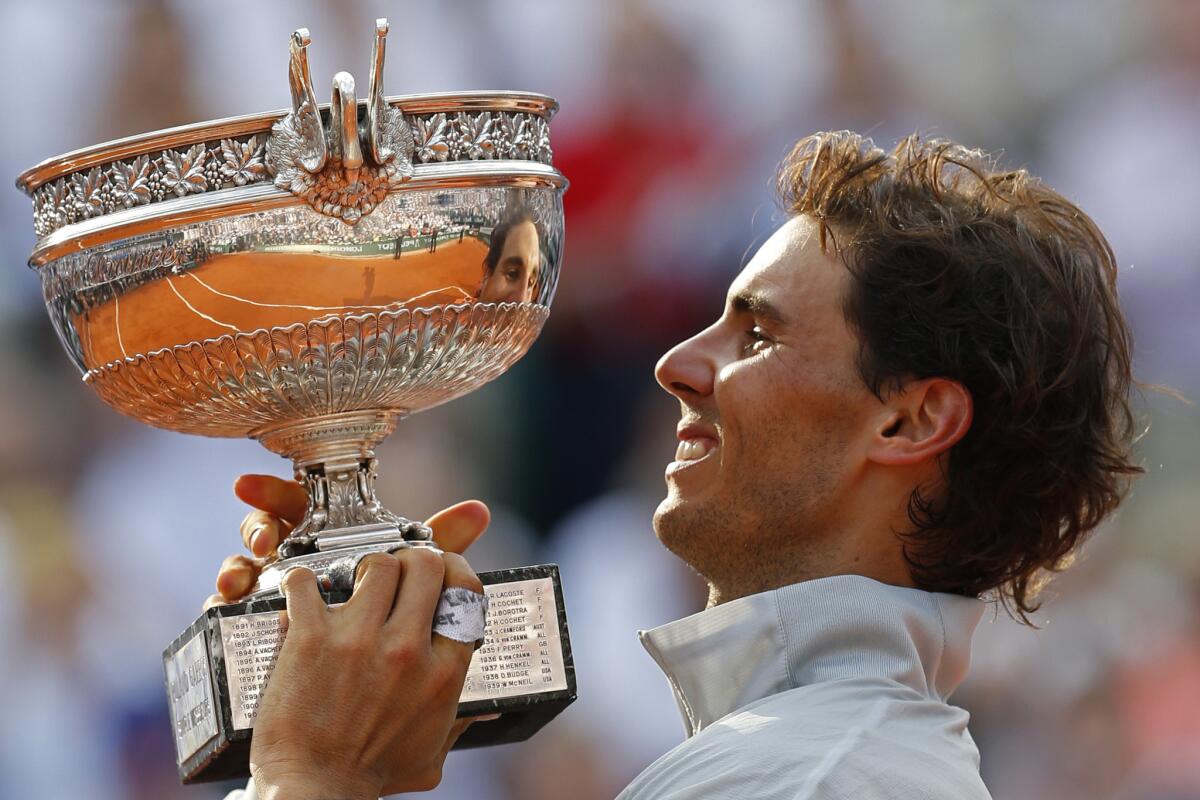
Rafael Nadal hoists the winner’s trophy after defeating Novak Djokovic in four sets in the French Open championship match on Sunday.
History both repeated itself and was made Sunday on the rust-red clay of Roland Garros.
After 3 1/2 grueling hours, Novak Djokovic served trying to save championship point in the fourth set against Rafael Nadal, the undisputed king of the French Open. Two years ago, Djokovic was in the exact same position in his first final against Nadal here in the land that invented the phrase “deja-vu.”
And just as it happened then, the 27-year-old Serb tossed the ball in the air, swung — and double faulted. And suddenly, his great Spanish rival, the miracle of Majorca, was on his knees, head in his hands, in joy and incredulity over his 3-6, 7-5, 6-2, 6-4 triumph.
It was Nadal’s ninth French Open title, and fifth in a row, and his 14th Grand Slam crown. No man has won the same major tournament that many times; only one woman in the Open era has, Martina Navratilova at Wimbledon. And no other player of either gender has won five consecutive French Opens.
Nadal’s revolutionary No. 9 came on a day of ideal weather both for the 15,000 spectators and for the 28-year-old Spaniard, whose topspin-heavy power game benefits from the extra speed granted by hot, windless conditions. His lethal forehand found its mark in key moments throughout the hard-hitting match to lift him to a second-place tie with Pete Sampras on the all-time Grand Slam title list, behind his other great rival, Roger Federer, who has 17.
But that statistic wasn’t foremost in the defending champion’s mind.
“The most important thing today is I won the most important tournament of the world in clay, probably the most important tournament of the year for me,” Nadal said. “I won against the toughest opponent possible today.”
The victory means that Nadal will keep his No. 1 ranking, which No. 2 Djokovic would have snatched away had he prevailed. The Serb was also denied the chance to join Nadal and Federer as the only active players on the men’s circuit to have won all four major tournaments.
“He was the better player in the crucial moments,” Djokovic said of his opponent. “Of course it’s disappointing to me, but life goes on.”
Djokovic had scored at least a moral victory before Sunday’s final. For once, Nadal was not considered the overwhelming favorite to take home the title; Djokovic had beaten him in their last four encounters, including last month’s clay-court final in Rome, and some tennis commentators picked him to finally break through on the dusty terre battue in Paris. Last year, Djokovic pushed Nadal to the limit before losing a heartbreaking semifinal, 9-7 in the fifth set.
But as he himself acknowledged, playing Nadal on Center Court at Roland Garros, where the Spanish southpaw has lost only once in 67 matches in the past decade, is “the ultimate challenge on clay.”
That challenge includes Nadal’s consistently aggressive groundstrokes, indefatigable court coverage, and a mastery of geometry and angles that would put a draftsman to shame. It also means facing a player who feasts on any sign of weakness and grows almost visibly in confidence and strength with each successful point.
The first set demonstrated just how well Djokovic and Nadal measure up against each other, as befits the two men who have met more times in Grand Slam tournaments — 12 — than any pair in history.
Rallies were slugfests that saw the players trade stroke for stroke, length for length, winner for winner. Each man constantly yanked the other from side to side, often turning defense into offense in the blink of an eye. But Djokovic exhibited greater creativity and variety, sneaking in drop shots and even a serve and volley — unusual in today’s game, even rarer on the high-bouncing clay — to catch Nadal off guard at the baseline.
Before the match, the crowd had observed a minute’s silence for the victims of World War I, which broke out a century ago after a Serbian nationalist assassinated Archduke Ferdinand of Austria. So perhaps it was appropriate that Djokovic, himself an outspokenly patriotic Serb, drew first blood by breaking Nadal in the eighth game, saving two break points against his own serve and pocketing the first set in 45 minutes.
But Nadal’s determination on court is legendary, and Roland Garros brings out his best. The punishing pace of his shots never slackened, and his willingness to charge on judicious occasions rewarded the Spaniard with the second set after another hour.
“I felt that the match was more in his hands at the beginning than in my hands. I was winning more points from his mistakes than from my winners, and I need to change that,” Nadal said. “I think in the second set that the dynamic of the match changed. . . . It was very important for me to win that second set.”
An early break in the third set put him into cruise control. By contrast, frustration — and errors — started creeping into Djokovic’s game, and soon the ever-expressive Serb was smashing his racquet on the ground in what proved to be a pivotal game, with Nadal serving at 4-2.
The game went to deuce five times and presented Djokovic with a chance to get back on serve. But some sloppy strokes allowed Nadal to stay alive, and then after relentlessly jerking Nadal around on game point, Djokovic netted a fairly easy backhand put-away. He stood and stared up at his entourage in the players’ box for several seconds, in disbelieving irritation.
“I started . . . playing quite bad, you know, and didn’t move as well,” said Djokovic, who had complained of fatigue in his four-set semifinal against Ernests Gulbis. “[I] struggled a little bit physically throughout that third set.”
There were signs of a potential resurgence in the fourth set, when Djokovic broke back immediately after going down 2-4, pounding Nadal’s backhand and trying to avoid his explosive forehand.
But by then, Nadal’s grunts had become full-throated battle cries, the tension had gone up several notches, and even a 30-0 lead for Djokovic in the final game offered no safety for the usurper trying to dethrone the king.
He lost three straight points, then served on match point. His first ball failed to go in, but as he wound up to try again, a spectator shouted and he had to abort. Moments later, he smacked his second serve well long, and his dream of a career Slam was back on hold for another year.
He refused to talk about the incident afterward, except to say that “I wasn’t managing to . . . bring my ‘A’ game when it was most needed in the end of the fourth.”
Nadal called the distraction “a little bit unfair” to Djokovic, who fought back tears as he collected the runner-up’s plate, the crowd on its feet to applaud his effort. The Serb’s desire to complete his Grand Slam resume, on the one big stage where success has eluded him, has been palpable; earlier this year, he added Boris Becker to his coaching lineup in pursuit of that goal.
Nadal, too, was emotional upon being presented the shiny Coupe des Mousquetaires by Bjorn Borg, the Swedish great whose record of six French crowns was smashed by Nadal in 2012. Borg won the first of his titles 40 years ago.
Nadal, who always celebrates his June 3 birthday at Roland Garros, said that each victory here becomes more emotional the older he gets, because he knows the chances for more titles decrease with each year.
“That’s not forever,” he said. “You have few more opportunities, yes, but you don’t know if you’re going to win it again.”
Not that anyone’s betting against it.
More to Read
Get our high school sports newsletter
Prep Rally is devoted to the SoCal high school sports experience, bringing you scores, stories and a behind-the-scenes look at what makes prep sports so popular.
You may occasionally receive promotional content from the Los Angeles Times.
